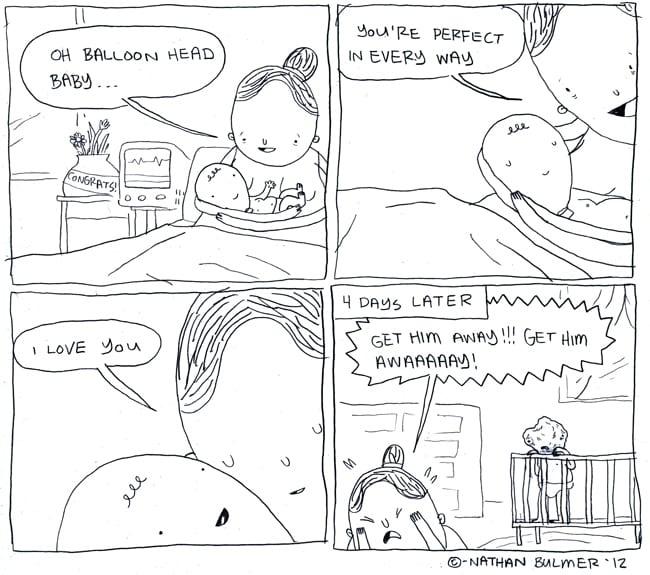 Get it? GET IT? GETITGETGITD:JGDJGDKKFCKFUCKGETGEIGIT IGITGI
Get it? GET IT? GETITGETGITD:JGDJGDKKFCKFUCKGETGEIGIT IGITGI
...Sorry. Let's just turn things over to Abhay.
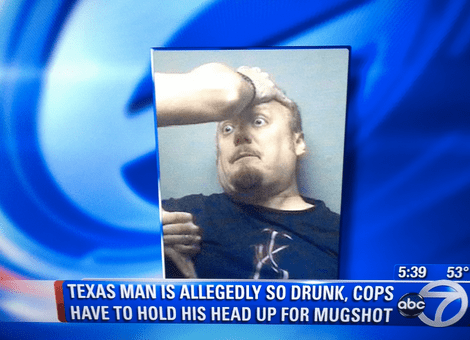 There was some kind of convention in New York. Comic books got promoted to the delight of people who attended in the hopes of having comics promoted at them. All of the different kinds of comics were promoted, from Comics for Lamewads to Comics for Spazzoids-- the entire medium. Those of us not in attendance were forced to press our wet little noses up to the web-ads glittering on our screens, and wonder-- perchance to dream-- what it'd be like to be in the middle of a marketing promotional weekend-long infomercial which we paid with our own money to attend. Yes, comic books were announced or teased or had their announcements teased-- life is a glorious but brief shriek of advertisements.
There was some kind of convention in New York. Comic books got promoted to the delight of people who attended in the hopes of having comics promoted at them. All of the different kinds of comics were promoted, from Comics for Lamewads to Comics for Spazzoids-- the entire medium. Those of us not in attendance were forced to press our wet little noses up to the web-ads glittering on our screens, and wonder-- perchance to dream-- what it'd be like to be in the middle of a marketing promotional weekend-long infomercial which we paid with our own money to attend. Yes, comic books were announced or teased or had their announcements teased-- life is a glorious but brief shriek of advertisements.
My thoughts, though, were distracted from these small miracles, by a bit of comic history: the 60th anniversary of Pogo's run for President of the United States.
In 1952, the beloved Walt Kelly character Pogo was a reluctant candidate for President of the United States for the first time. He quickly earned the support of the Harvard Crimson, who distributed 3000 free "I Go Pogo" buttons to students.
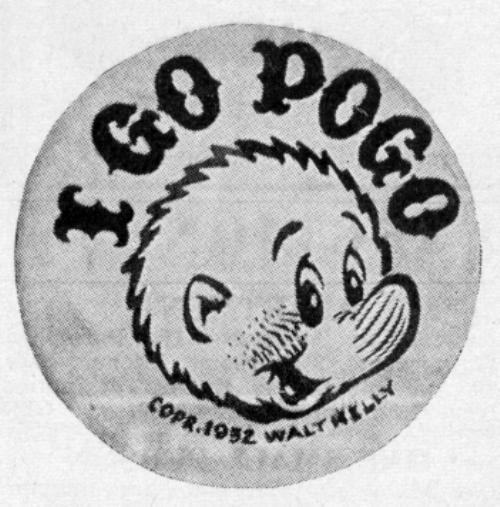
Why, wouldn't you know that Harvard University even invited Mr. Walt Kelly himself to go on down and talk to the students at a Pogo rally, with the Harvard band to attend? Unfortunately, on May 15, 1952, Walt Kelly was late to the speech.
So, that's when the violence started.
The numbers of Harvard students waiting for Walt Kelly to show swelled from 200 to 1600. Bored students, temporarily deprived of the dulcet tones of one of America's foremost funny-animal cartoonists, began to disconnect poles powering the electric trolleys and according to some reports, attempted to overturn cars. So of course, "Police rushed the crowd, beating and arresting students."
"All of a sudden it just erupted," Pogo Riot attendee Paul R. Rugo said later. Rugo ended up in a fist-fight with police and was arrested along with 27 other Harvard students. The Pogo Riot was later described as a "three-hour fracas." Witnesses signed statements alleging that police "used excessive force, [hitting] students with clubs and fists." Rugo was taken to the police station where policemen allegedly clubbed him on the head. Thirty-five years later, one of the editors of the Harvard Crimson could still recall David Halberstam (later, the author of the famous Kennedy Administration book The Best and the Brightest) "covered in blood."
In the aftermath, the Harvard Crimson published a letter to the editor attacking the Harvard students for their actions in the Pogo Riot and defending the police:
Though European students may riot about Communism or Triest, Harvard is right within the American college tradition of rioting over such things as Pogo, ice cream, panties and brassieres. [...] Though they might have been slightly extreme (and I say slightly because, despite the CRIMSON stories of brutality, no broken skulls resulted, but only a few bruises shared by students and police), the police did break up the riot with the only method available to them.
So, just a little slice of comics history, a time when comics could make Harvard students riot.
Meanwhile, in current events, Frank Miller was sued for allegedly letting his girlfriend smear her shit all over the place.
OKAY NOW
Daredevil 213
By Denny O'Neil, David Mazzuchelli, Danny Bulanadi, Bob Sharen
Published by Marvel, 1984

It's probably just me, but isn't Daredevil saying "So he is. I forgot" as he throws an old man off-panel sort of hilarious? No? Just me then? Okay.
This is another chapter in what must have seemed like an endless story about Micah Synn, this time around focusing on that ever so popular aspect of gritty '70s/'80s cop fiction where the protagonist is prevented from catching criminals not due to a lack of prowess, but because the mother-fudging legal system has so many GD loopholes. Of course, that particular buck-o-stink paves the way for the other popular twist of this particular field of fiction: it means our hero can go rogue, and in a Daredevil comic, what better way is there to go off the reservation than to team up with Kingpin? (He could also team up with the Punisher. Or he could play Russian roulette with a comatose Bullseye. Maybe proclaim himself the new Kingpin. Wear armor? Become an actual devil? Maybe that's not a good line of thought to chase around.)
Anyway: he teams up with the Kingpin, although it turns out he didn't have to, because Mr. Micah Synn goes ahead and kills somebody with the gigantic jungle man-trap (tiger trap?) Synn has built in his Bret Easton Ellis-influenced yuppie penthouse (yuppies!), a murder that gives Daredevil the chance to utter the phrase "this charge they won't be able to lie their way out of," which I'm pretty sure Denzel Washington says in both The Pelican Brief AND Philadelphia, and then the comic gives way to a letters column, where it turns out that the reason Harlan Ellison had interrupted what is clearly turning into the Micah Synn epic is because that's who Marvel had on their speed dial as a pinch hitter in case Denny O'Neil got himself hospitalized, which apparently he had. Will that brush with death, by way of a clogged artery, change O'Neil's perspective on the Synn storyline?: only time, or one of you commenters who lust to spoil my pleasures, will tell.
Prophet #29
By Brandon Graham, Farel Dalrymple, Joseph Bergin III, Charo Solis
Published by Image Comics

If you've spent a second wondering why Farel Dalrymple's contributions to the House of Prophet seemed to be taking a while to come out, wonder no longer, as the answer to that question is available in just about every single panel of Prophet #29, his second issue of the title. Regardless of one's enjoyment of the script he's working from--personally, Graham's work with his other artists (Simon Roy and Giannis Milonogiannis) reads a bit more fun, a bit looser than this issue's omnipresent monologue--it's hard not to be wowed by Dalrymple's drawing ability, to look at the edge of a page and easily imagine the panels extending further than the paper can contain. Stand some of these up alongside Theo Ellsworth's masterfully psychedelic Understanding Monster; they fit there more than they do most of what Image provides.
Superman #0
By Scott Lobdell, Kenneth Rocafort, Sunny Gho
Published by DC Comics

Lobdell and Rocafort are the guys who initially came to disrepute when they began their run on a DC title called Red Hood and The Outlaws by depicting the Starfire character as an amnesiac sex object, which clashed with her more classical depiction, wherein she remembered the sex she had. And while you couldn't really "look past all that" and find much else--Red Hood and The Outlaws was sex and violence, and that's it--it spent the last year being consistent, which is way more than you can say for the majority of the New 52 titles. One of the more egregious failures has been on the Superman title (Grant Morrison's Superman appears in Action Comics, and while that title hasn't failed as spectacularly as Superman, it certainly couldn't be listed as anything approximating a success, either). Superman has been a non-stop revolving door, using up and spitting out a line-up of creators from every decade that human mortality hasn't closed itself to, and while DC's editors are certainly somewhat responsible--with Superman's Eddie Berganza being the worst of that notoriously terrible bunch--the placing of Lobell and Rocafort in the you-fix-it role is the best call DC has made with the character. This issue is a loose origin story for the character's family that does the unthinkable and makes Superman's mother interesting enough that you might actually not want to see her die in a planetary holocaust, and it showcases all of what Lodbell and Rocafort have spent the last year doing on Red Hood: weird art (Rocafort's main influences are '90s X-Men comics and those cheap kaleidoscopes you find at fireworks stores) and Lobdell's slick, fast-moving dialog. As was often the case in his Red Hood scripts, this issue sees an internal monologue delivered faux-documentery style to the reader, usually working to set up and comment upon whatever the rest of the comic and its characters were saying while mostly ignoring what they were doing. This is a choice that works well with Rocafort's overly-complicated page layouts, most of which make sense only when you realize that the artist has figured out that it's in his professional interest to make an impact on the reader, and it isn't like Lobdell is giving him much to work with anyway. They rarely hurt each other, but that isn't a definition of helping, now is it?
The Punisher #16
By Greg Rucka, Marco Checchetto, Matt Hollingsworth
Published by Marvel

Similar to Superman #0, this is a competently done super-hero comic that makes surprisingly good use of digital tweaking atop art that probably didn't need it, resulting in a comic that feels like more work was put into it that its audience expected, a rare enough occurrence to give one an enjoyable buzz not dissimilar to flat-out enjoyment. Everybody here seems to be trying, and while that shouldn't garner too much praise ... well, if you read a bunch of these at once, you'd have a hard time going to the mattresses when there's one that actually gives a shit. And while all of Rucka's failings on this title are front and center--he clearly dislikes the character, has watched Se7en way too often and way too recently, and will probably go to his grave still getting in the way of a good action scene--his vague neglect of his lead results in an unexpected breeze of coolness, making for one of those rare times when you find yourself looking at a superhero drawing and wondering, you know: should I buy a jacket like that?
Crossed Badlands #15
By David Hine, Eduardo Vienna, Digikore
Published by Avatar
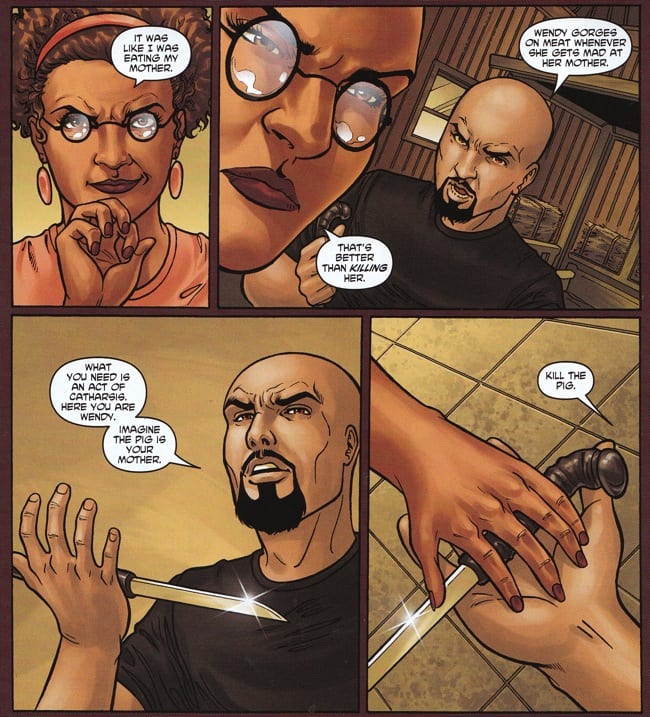
So, this is about Morrison Con, actually? It's about rape and mutilation and sexual violence and murder, sure, but it's set in a way that lets you make fun of the cult of personality surrounding Grant Morrison. As that, as a poking-fun-at-Grant comic, it's toothless, weak comedy, not the sort of think you'd expect if you've read reviews of David Hine's comics, but exactly the kind of thing you'd see coming if you confined yourself to only reading David Hine's comics. But for what it's worth, there's still an achievement here: somebody finally managed to make a Crossed comic that's unwilling to offend.
Secret Service #4
By Mark Millar, Dave Gibbons, Matthew Vaughn, Andy Lanning, Angus McKie
Published by Icon

Mark Millar is the same guy that once wrote a Wolverine comic book set in a Nazi concentration camp where it was revealed that Wolverine liked to travel around, driving Nazis to failure and suicide by pretending to be an unkillable Jew that kept magically surviving the ovens--this isn't a joke, I feel the need to say that--while inexplicably choosing not to just go all Wolverine-y with his claws and what not on the Nazis, because spooking them I'm-just-standing-here style was just way more literary or something. This guy wrote that. And you know what?
There wasn't a single word in the story of Wolverine: The Uncookable Jew Who Stands There that rang as false as the passage depicted in the panel above.
Winter Soldier #11
By Ed Brubaker, Butch Guice, Brian Thies, Bettie Breitweiser
Published by Marvel Comics
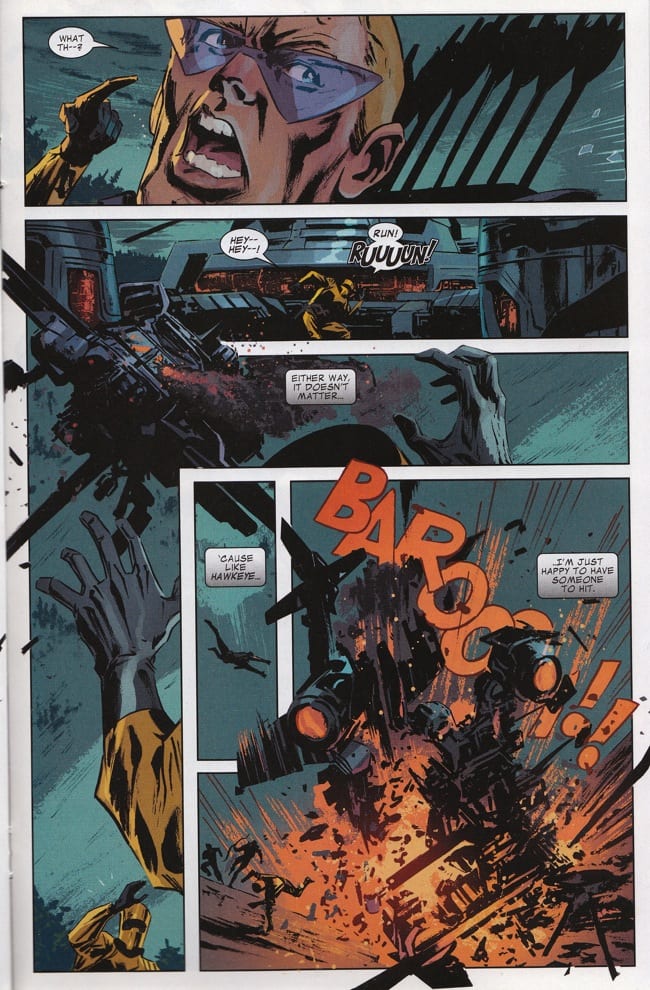
Hawkeye shows up in this, apparently because Ed Brubaker wanted to do some kind of buddy cop kind of thing, and it works about as well as it did to team up Bruce Willis with Justin Long in that last Die Hard movie. Hawkeye just never made sense to me. Not the archer thing, that makes sense fine, but that anyone liked the character. He's like Doctor Who and Green Lantern, characters that just seem like they exist just beyond the edge of what you should care about, that they represent the line beyond which you hear plates clattering to the floor, because your mother's hands just jumped involuntarily to her mouth as she gasped. (Aquaman used to be in this camp, until Geoff Johns landed upon the solution nobody else had thought of, which was to embrace "being a huge fucking joke" as a major part of DC continuity, and considering that cutting off the character's hand gave him nearly a decade of apparent viability, playing him like a Michael Kupperman character will probably earn him a Noah Baumbach movie.) It's not that Hawkeye (or the Doctor, or Green Lantern) actually are from an actual kind of netherworld of pre-Gandhi untouchability, it's that they represent a very personal one, a knee jerk response of "no thanks" said incredulously, because isn't everybody's answer going to be no? Which is of course false: these characters are hilariously popular, hysterically so, they're at a level right now they haven't been at before and it doesn't seem to show any sign of slowing. But, like Captain Britain and Chester Brown, there's some things that are just anathema, and for now, today, and most likely forever: Hawkeye is the fucking worst.







